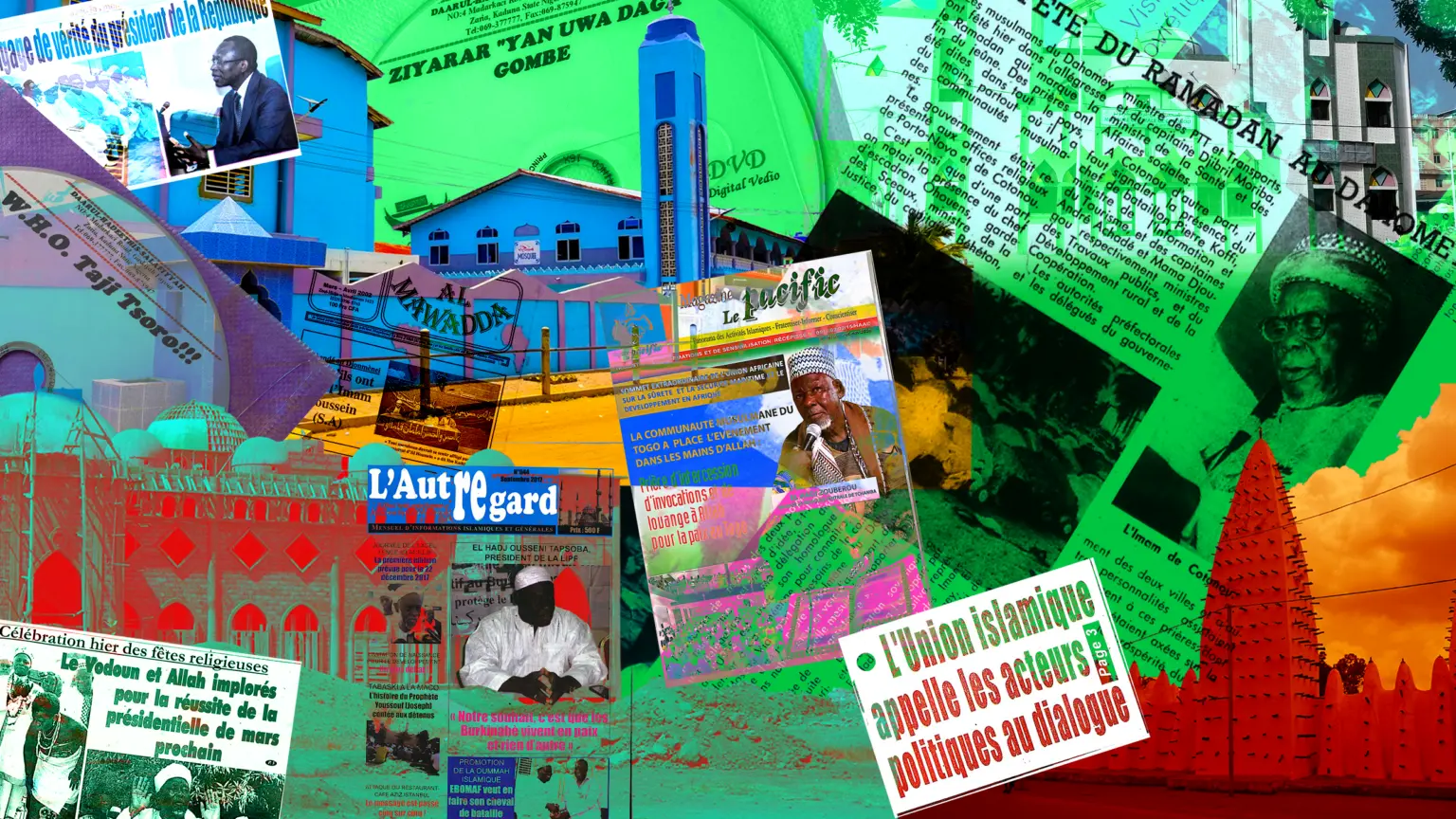Le sentiment à l'égard de certaines questions, d'associations islamiques ou de dirigeants musulmans peut devenir plus positif ou négatif en réponse à des événements spécifiques ou à des changements sociaux plus larges. En voici quelques exemples :
Bénin
Burkina Faso
Code Python
This file contains hidden or bidirectional Unicode text that may be interpreted or compiled differently than what appears below. To review, open the file in an editor that reveals hidden Unicode characters.
Learn more about bidirectional Unicode characters
| import requests | |
| import re | |
| import stanza | |
| import pandas as pd | |
| import nltk | |
| from textblob import TextBlob | |
| from textblob_fr import PatternTagger, PatternAnalyzer | |
| from nltk.corpus import stopwords | |
| from tqdm import tqdm | |
| from plotly.offline import plot | |
| import plotly.express as px | |
| # Download necessary resources | |
| nltk.download('stopwords') | |
| nltk.download('punkt') | |
| # Load French stop words | |
| french_stopwords = set(stopwords.words('french')) | {'El', '000', '%'} | |
| french_stopwords = set(word.lower() for word in french_stopwords) | |
| # Initialize Stanza French model | |
| nlp = stanza.Pipeline(lang='fr', processors='tokenize,mwt,pos,lemma') | |
| # Compile regular expressions for text cleaning | |
| newline_re = re.compile(r'\n') | |
| apostrophe_re = re.compile(r"’") | |
| whitespace_re = re.compile(r"\s+") | |
| oe_re = re.compile(r"œ") | |
| def fetch_items_from_set(item_set_ids): | |
| base_url = "https://iwac.frederickmadore.com/api/items" | |
| items = [] | |
| for set_id in tqdm(item_set_ids, desc="Fetching item sets"): | |
| page = 1 | |
| while True: | |
| response = requests.get(f"{base_url}?item_set_id={set_id}&page={page}") | |
| data = response.json() | |
| if not data: | |
| break | |
| items.extend(data) | |
| page += 1 | |
| return items | |
| def extract_texts_and_dates(items, subject_resource_id): | |
| texts = [] | |
| dates = [] | |
| for item in tqdm(items, desc="Extracting texts and dates"): | |
| # Check if the item has the specified subject | |
| subjects = item.get('dcterms:subject', []) | |
| if any(sub.get('value_resource_id') == subject_resource_id for sub in subjects if sub.get('is_public', True)): | |
| date_content = next((content.get('@value', '') for content in item.get('dcterms:date', []) if content.get('is_public', True)), None) | |
| if date_content: # Ensure there is a date before adding the text | |
| if "bibo:content" in item: | |
| content_blocks = item["bibo:content"] | |
| for content in content_blocks: | |
| if content.get('property_label') == 'content' and content.get('is_public', True): | |
| text_content = content.get('@value', '') | |
| if text_content: # Ensure there is text content | |
| texts.append(text_content) | |
| dates.append(date_content) # Only add date if there's a corresponding text | |
| return texts, dates | |
| def preprocess_texts(texts): | |
| processed_texts = [] | |
| for text in tqdm(texts, desc="Preprocessing texts"): | |
| text = newline_re.sub(' ', text) | |
| text = apostrophe_re.sub("'", text) | |
| text = whitespace_re.sub(" ", text) | |
| text = oe_re.sub("oe", text) | |
| text = text.strip().lower() # Convert to lower case before processing | |
| # Process the cleaned text with Stanza | |
| doc = nlp(text) | |
| tokens = [word.lemma.lower() for sent in doc.sentences for word in sent.words | |
| if word.upos not in ['PUNCT', 'SYM', 'X'] and word.lemma.lower() not in french_stopwords] | |
| processed_text = ' '.join(tokens) | |
| processed_texts.append(processed_text) | |
| return processed_texts | |
| def analyze_sentiments(texts): | |
| sentiments = [] | |
| for text in tqdm(texts, desc="Analyzing sentiments"): | |
| blob = TextBlob(text, pos_tagger=PatternTagger(), analyzer=PatternAnalyzer()) | |
| polarity = blob.sentiment[0] | |
| sentiments.append(polarity) | |
| return sentiments | |
| def create_polarity_time_series(sentiments, dates, file_name): | |
| df = pd.DataFrame({'Date': dates, 'Polarity': sentiments}) | |
| # Convert date strings to datetime objects, handling different formats | |
| df['Date'] = pd.to_datetime(df['Date'], errors='coerce') | |
| # Remove any rows where dates could not be converted (if any) | |
| df = df.dropna(subset=['Date']) | |
| # Group by Date and calculate mean Polarity | |
| df = df.groupby('Date').mean().reset_index() | |
| # Create the figure with a range slider | |
| fig = px.line(df, x='Date', y='Polarity', title="Mean polarity over time for keyword Hadj") | |
| fig.update_layout( | |
| xaxis=dict( | |
| rangeselector=dict( | |
| buttons=list([ | |
| dict(count=1, label="1Y", step="year", stepmode="backward"), | |
| dict(count=5, label="5Y", step="year", stepmode="backward"), | |
| dict(count=10, label="10Y", step="year", stepmode="backward"), | |
| dict(step="all") | |
| ]) | |
| ), | |
| rangeslider=dict( | |
| visible=True | |
| ), | |
| type="date" | |
| ) | |
| ) | |
| plot(fig, filename=file_name) | |
| def main(): | |
| benin_item_sets = [2187, 2188, 2189] | |
| burkina_faso_item_sets = [2200, 2215, 2214, 2207, 2201] | |
| subject_resource_id = 29 # ID for a specific subject | |
| benin_items = fetch_items_from_set(benin_item_sets) | |
| burkina_faso_items = fetch_items_from_set(burkina_faso_item_sets) | |
| benin_texts, benin_dates = extract_texts_and_dates(benin_items, subject_resource_id) | |
| burkina_faso_texts, burkina_faso_dates = extract_texts_and_dates(burkina_faso_items, subject_resource_id) | |
| benin_processed = preprocess_texts(benin_texts) | |
| burkina_faso_processed = preprocess_texts(burkina_faso_texts) | |
| benin_sentiments = analyze_sentiments(benin_processed) | |
| burkina_faso_sentiments = analyze_sentiments(burkina_faso_processed) | |
| create_polarity_time_series(benin_sentiments, benin_dates, 'polarity_time_series_subject_benin.html') | |
| create_polarity_time_series(burkina_faso_sentiments, burkina_faso_dates, 'polarity_time_series_subject_burkina_faso.html') | |
| if __name__ == "__main__": | |
| main() |

